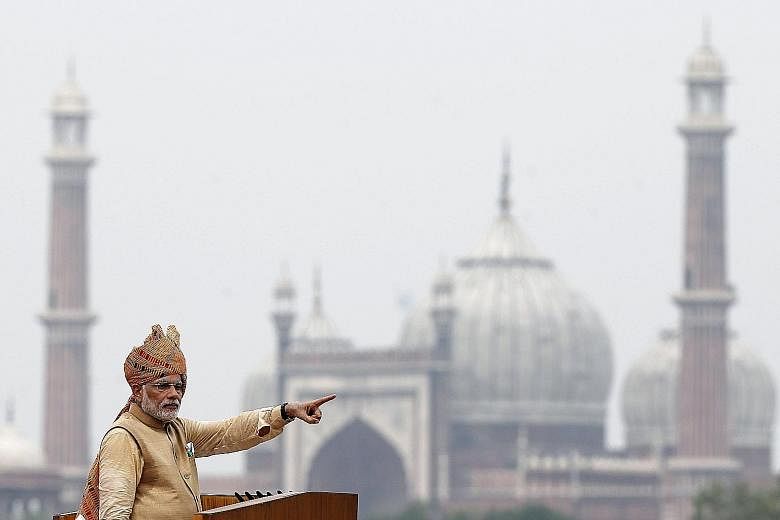Indian Prime Minister Narendra Modi said in his Independence Day speech he was determined to "end the termite of corruption", as he tried to restore sheen to his leadership while reaching out to the poor ahead of crucial state elections.
Mr Modi, who came to power after landslide elections last year, has been hit by a series of scandals involving his Cabinet and party colleagues. While the economy is growing at around 7.5 per cent, it still has not attained the momentum needed to make a difference to hundreds of millions of people mired in poverty.
A delay in passing crucial economic reforms, such as the goods and services tax and simplifying land acquisition rules, has disappointed the corporate sector.
In a 90-minute speech delivered from the ramparts of the Mughal- era Red Fort, Mr Modi chose to skip the issue of reforms and, instead, countered criticism that his government was pro-business and anti- farmer.
He pledged to provide electricity to 18,500 villages in the next 1,000 days and also announced the renaming of the Ministry of Agriculture to Ministry of Agriculture and Farmers' Welfare to highlight his commitment to distressed farmers.
-
PM Lee and Dr Tan extend greetings
-
Singapore's President Tony Tan Keng Yam and Prime Minister Lee Hsien Loong have written to their Indian counterparts to convey their congratulations on the occasion of India's 69th Independence Day, the Ministry of Foreign Affairs said in a statement yesterday.
Writing to Indian President Pranab Mukherjee, Dr Tan said Singapore and India had developed a "special relationship rooted in strong historical and cultural ties, and bolstered by close and growing cooperation in various sectors". He said he and his wife had fond memories of the hospitality they had received during his state visit to India in February this year.
With both countries celebrating 50 years of diplomatic ties, he said he was confident that relations would continue to deepen.
Writing to Prime Minister Narendra Modi, Mr Lee noted that India was among the first countries to recognise Singapore when it gained independence.
"India has come a long way since its independence in 1947. Through hard work, determination and visionary leadership, the Indian people have wrought a transformative change in the country.
"Today, we enjoy excellent relations and cooperation in ever-widening fields. I am heartened that both countries continue to forge close ties and linkages at all levels," Mr Lee said.
"I look forward to welcoming you to Singapore in November," he added.
"All our schemes must serve the poor. The doors of the banks were not open for the poor. We decided this must end. We wanted to strengthen financial inclusion," he said, listing his government's achievements, such as the opening of 170 million bank accounts for the poor and building toilets in almost all schools.
The focus on the poor comes as Mr Modi faces a political test in October in elections in Bihar, where the opposition has painted him as a politician running a "suit, boot" government indifferent to the poor.
Similarly, he raised the problem of entrenched corruption after some of the most senior figures in his Bharatiya Janata Party became embroiled in corruption scandals, including Foreign Minister Sushma Swaraj and the chief ministers of Rajasthan and Madhya Pradesh states. He said: "I want to tell the people of the country that India can become free of corruption. It has to start from the top. Corruption is eating up our country like termites."
Analysts said Mr Modi's speech fell short of expectations and was unusual for the number of issues it did not touch upon, including the recent parliamentary session where the rival Congress party has been stalling proceedings.
Mr Modi was faulted for not doing enough to engage the opposition to push the reforms agenda.
Said analyst N Bhaskara Rao: "He didn't talk about bringing investments or reforms.
He confined himself to giving a report of what he has initiated in a few areas, such as opening bank accounts for the poor. He didn't touch on international affairs even though his government has focused on foreign policy."
Many were disappointed that no major schemes were unveiled.
"Independence Day is the occasion when prime ministers usually roll out some significant policy for the nation," said political analyst Sudhir Panwar.
Still, some on social media were appreciative of Mr Modi's commitment to the Clean India campaign, recalling his speech last year where he tackled issues such as sexual violence and the lack of toilets.
"I, for one, am glad that Modi's talking about toilets again this year," said one tweet.

